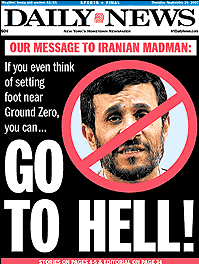Islamofascism’s ill political wind
In contrast to the way militant zealotries of other religions have been perceived, there is a broad conviction, especially among many conservative American Christians, that the inner logic of Islam and fascism go together. Political candidates appeal to those Christians by defining the ambition of Islamofascists in language that makes prior threats from, say, Hitler or Stalin seem benign. The point is that there is a deep religious prejudice at work, and when politicians adopt its code, they make it worse.
The Democrats gain little by shaping their rhetoric to appeal to the Republicans’ conservative religious base, but a readiness to denigrate Islam shows up on their side, too. In last week’s debate, moderator Brian Williams put to Barack Obama a question about Internet rumors that claim he is a Muslim. The tone of the question suggested that Obama was being accused of something heinous. He replied with a simple affirmation that he is a Christian. He did not then ask, “And what would be wrong if I were a Muslim?” Had he done so, it seems clear, he would have cost himself votes in the present climate. [complete article]
… in his Sunday speech at the Rev. Martin Luther King Jr’s Ebenezer Baptist Church in Atlanta, Barack Obama went to a higher ground — to that mountaintop that King occupied until his death on April 4, 1968, and that Bobby Kennedy stood for a brief and remarkable political moment that played out between April and June of that fateful year.
“Unity is the great need of the hour – the great need of this hour. Not because it sounds pleasant or because it makes us feel good, but because it’s the only way we can overcome the essential deficit that exists in this country,” Obama told a audience that hung on the every word of the most emotionally-effective orator to seek the presidency since Kennedy.
“I’m not talking about a budget deficit. I’m not talking about a trade deficit. I’m not talking about a deficit of good ideas or new plans,” explained Obama. “I’m talking about a moral deficit. I’m talking about an empathy deficit. I’m taking about an inability to recognize ourselves in one another; to understand that we are our brother’s keeper; we are our sister’s keeper; that, in the words of Dr. King, we are all tied together in a single garment of destiny.” [complete article]
What does it mean to be the pro-Israel candidate?
The main reason that Democratic candidates are less frightening to a progressive Israeli worrying about his country’s future, as my progressive friends in Washington remind me, is that the Democrats may be jiving. That is, because they are sensible folks otherwise, we can assume they don’t really mean this stuff. They even hide small hints of moderation in their rhetoric. The Republicans’ sincerity is truly scary.
I suggest that it’s time to talk about what “pro-Israel” should mean. Not because the discussion will change campaign rhetoric: The candidates will stick to cliches. But after the election, one will have to govern. Members of Congress will need to decide how to vote on the usual strident resolutions backed by AIPAC. Debate now on what it means to support Israel might mean that a year from now, elected leaders will be able to refer to publicly recognized ideas to justify acting more sensibly. [complete article]

 …the US media have once again fallen victim to an orchestration of “enemy image” that aims to vilify, intimidate, deface and demonize a Middle Eastern leader who, ironically, has been unusually forthcoming in his expressions of warm feelings toward the American people (though not the US government and its policies).
…the US media have once again fallen victim to an orchestration of “enemy image” that aims to vilify, intimidate, deface and demonize a Middle Eastern leader who, ironically, has been unusually forthcoming in his expressions of warm feelings toward the American people (though not the US government and its policies).